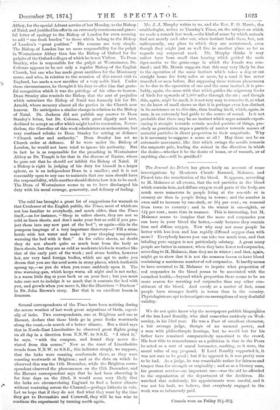The Journal des Mats has given lately an account of
some investigations by Messieurs Claude Bernard, Malassez, and Picard into the constitution of the blood. It appears, according to M. Malassez at all events, that the red particles in the blood which contain iron, and diffuse oxygen to all parts of the body, are much more numerous in people living at the sea-side or in country air than in people living in towns ; and the number is even said to increase by one-sixth, or 16 per cent., on removal from town to country ; and in the winter is one-eighth, or 121 per cent., more than in summer. This is interesting, but M. Malassez seems to imagine that the more red corpuscles you can have in your blood the better,—only because they contain iron and diffuse oxygen. Now why may not some people be better with less iron and less rapidly diffused oxygen than with more? Everybody knows you can take too much iron, and that inhaling pure oxygen is not particularly salutary. A great many people are better in summer, when they have fewer red corpuscles, according to M. Malaasez, than they are in winter ; and that, again, might go to show that it is not the summum bonum to have blood containing a maximum number of red corpuscles. It hardly seems to have occurred to M. Malassez to inquire what proportion of red corpuscles in the blood seems to be associated with the soundest health,—beyond which proportion there seems to be no more reason for coveting red corpuscles than any other con- stituent of the blood. And surely as a matter of fact, some people have stronger health in towns than in the country. Physiologists are apt to investigate on assumptions of very doubtful validity.


































 Previous page
Previous page